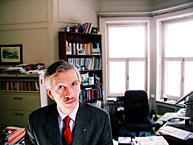State of the (European) Union
Sixty years ago, France was locked in a death struggle with Germany. Fifteen years ago Poland and Czechoslovakia were locked behind the Iron Curtain. Today, France and Germany form the heart of international resistance to the war plans of the U.S., while Poland and the Czech Republic are two of its more loyal supporters.
 Armand De Mestral, co-director of the Institute for European Studies
Armand De Mestral, co-director of the Institute for European StudiesPhoto: Claudio Calligaris |
|
To refer to a united Europe in this light seems counterintuitive, but comparative law professor Armand De Mestral, co-director of the Institute for European Studies (IES), said that European identity trumps these family squabbles. That the European Union works and continues to grow despite these differences is what makes it such a fascinating area of study for De Mestral and his colleagues.
"These are 360 million of the most interesting and dynamic people in the world. The European Union is only 45 years old but it is a remarkable economic, social and political construction. It's the second most powerful legislative body in the world after the U.S. Congress. So for Canadians, after the Unites States, Europe is absolutely key, and many people feel it is not sufficiently understood," said De Mestral.
The Institute is the only joint teaching institute between McGill and the Université de Montréal, and is co-directed by De Mestral and U de M political science professor Jane Jenson. Founded three years ago as one of four such Canadian institutes, it was funded in part by the EU with a mission to encourage research and scholarship on Europe. For this, the IES offers a range of scholarships for graduate students, sponsors an active speakers series, conferences and round-table discussions. They are also hoping to establish a graduate studies concentration in the field.
"European studies is anything that is very broadly related to the work of the European Union. That covers almost everything -- economic and political, social, philosophy and law. There's not a lot that gets left out," said De Mestral.
Sounds fairly broad, but there has never been a project like the EU. So far 15 countries have voluntarily given up sovereignty over what used to be areas of national jurisdiction -- in finance, social policy and the environment. Ten more are set to join in the next few years.
"They have ceased to represent themselves on many international bodies; they are represented by the EU. In fields like air transportation, it is certain that the EU will be the only voice for these countries," said De Mestral. It's not just a diplomatic and economic organization either. With its expansion to the border of Russia, the EU is asserting a cultural identity as well.
"It's not particularly for economic reasons they're taking on these ten new members. In fact, it will probably be very costly," said De Mestral "[But] culturally they're Europeans."
So why does it matter for Canadians? The EU accounted for a mere 5.3 percent of our exports last year, compared to 85 percent for the U.S. First of all, the creation of a new federal body such as this provides plenty of grist for an expert in international trade and comparative constitutional law like De Mestral. The contrasts are sometimes surprising.
"There are many very interesting comparisons to be made to the Canadian political process and the dynamics of the European Union. Compare the limited rights of member states in the EU to run a deficit, compared to the complete freedom of the Canadian provinces to set their own fiscal policy."
Antonia Maioni is currently receiving support from the IES for her research comparing Canadian and European health-care systems.
"What we want to do is put the Canadian situation in comparative context with European health-care systems. This stems from the sense that one of the best ways to understand Canada, and Canadian issues, is to put some context into the research focus.
"In the case of health care, we are interested in exploring how the same tensions we find in Canada, between integration and heterogeneity in delivery and financing of health care across different jurisdictions, are played out in the European context with specific reference to the countries of the European Union," she explained.
True to the cooperative nature of the IES, Maioni is organizing a research symposium in September with André-Pierre Contandriopoulos from the Université de Montréal faculty of medicine.
Canada has direct ties to the EU as well, one of which is the subject of a round table hosted by the IES on March 13. This is the new trade agreement currently being negotiated between Canada and the EU.
"Nobody is quite sure if it will be a new free trade area, or some new form of economic arrangement. It's likely they'll want to include new economic activities like high tech, perhaps cultural policy intellectual property questions. They want to deal with the more cutting-edge issues than your standard trade agreement," said De Mestral of the proposed treaty.
The March 13 discussion will include the Ambassador of the European Commission to Canada, senior vice-presidents from Alcan and Bombardier, as well as academics and Canadian civil servants.
"Part of our job is outreach, to explain the European community to business and the community at large," said De Mestral.
The European Union and Canada Working Towards a New Form of Bilateral Trade Agreement: How Can This Best Be Achieved? McGill Faculty Club, 3450 McTavish, 3:30-6 pm, March 13.

